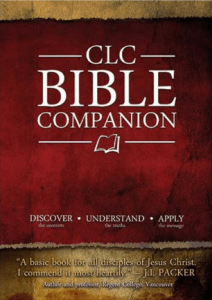Knowing Jesus: Jesus the Messiah
From the CLC Bible Companion
Jesus is called “the Messiah” or “Christ” because of his unique role in fulfilling the promises that God made to the Jewish people long ago.
OLD TESTAMENT PROMISES
Throughout the Old Testament, God made it clear that his people Israel were to play a special part in his plan to rescue and restore the world. When God called Abraham, he promised him that his descendants would be a blessing to everyone on the earth (Genesis 12:1-3). As the prophet Isaiah said over 1,000 years later, Israel were supposed to be a light to the nations, revealing the way to worship and serve the true God (eg Isaiah 60:1-3).
Through Israel, God would invite the whole world to discover his salvation. However, the people of Israel kept wandering away from the true God. Instead of being a light to the nations, they copied the practices of the nations around them and worshipped idols. Because they were not faithful to him, God allowed the Israelites to be defeated by their enemies and eventually carried into exile. It was clear that Israel needed to be saved too.
In the Old Testament, God used many individuals to rescue his people from their difficulties: for example, Moses led the Israelites out of slavery in Egypt (see Exodus 1–15); wise and brave leaders like Deborah and Gideon helped the Israelites to defeat their enemies (see Judges); kings like David and Solomon brought honour and wealth to the nation (see 1 Chronicles 29); prophets called on the people to repent and follow the ways of God; and after the exile, a governor named Nehemiah and a priest called Ezra helped to rebuild Jerusalem and the temple.
Despite these, it was never long before Israel needed to be saved again. The great leaders in Israel’s history were not able to bring about permanent salvation and blessing for Israel and the world. But still God promised that a day would come when Israel would be saved once and for all. Some of these prophecies spoke about a wonderful leader who would be sent by God to accomplish this salvation. This leader would be greater than Moses (Deuteronomy 18:15-18) and David (2 Samuel 7:12-16). Isaiah’s prophecy describes this mysterious person as a just and wise ruler (Isaiah 9:6-7), and as a faithful servant of God (42:1-9) who will deal with Israel’s sin (52:13–53:12) and so reveal God’s light and salvation to the whole world (42:6; 49:6), just as God had promised.
This servant will be able to accomplish all these things because he will be anointed with God’s Spirit (Isaiah 61:1). In the Old Testament, a person was anointed with oil in order to be set apart to do special tasks for God, particularly as a king or priest (eg 1 Samuel 16:13; Leviticus 8:12). Prophets too were set apart by God (eg Jeremiah 1:5). At the end of the Old Testament period, some people in Israel were looking for the greatest prophet, priest and king – the greatest “anointed one” – to come to establish God’s permanent kingdom of peace (Zechariah 9:9-10).
JEWISH EXPECTATIONS
In the years between the Old and New Testaments, the expectation that an “anointed one” would come to save Israel grew. Ever since their return from exile, apart from the short period between 140 and 63 BC, the people of Israel had been ruled by a succession of foreign empires: first Persian, then Greek, then Egyptian, then Syrian and finally Roman. Jews longed to be free to rule themselves, and some began regularly using the Hebrew term for “anointed one” – our word Messiah – to describe a coming leader who would liberate them and restore their former glory.
There were many different ideas about what this Messiah would be like. Generally, people thought he would be a king greater than King David, who would lead a successful revolt against foreign powers. In the Dead Sea Scrolls two different Messiahs are expected, one a king and the other a priest. The priestly Messiah would clean out and rebuild the temple in Jerusalem. This was necessary because the temple had been defiled by Israel’s foreign rulers – particularly by Antiochus Epiphanes the Syrian, who had built a pagan altar in the temple in 167 BC. Even though Judas Maccabaeus had led a successful military revolt and had reconsecrated the temple in 164 BC, other Jews still looked for the true Messiah to come and bring God’s salvation once and for all. What connected these expectations was a belief that the Messiah would fulfil Jewish dreams of greatness.
THE REALITY OF JESUS
The New Testament declares that Jesus is the Messiah who was promised in the Old Testament (Mark 1:1; John 20:31; Acts 18:28). However, while Jesus fulfilled Old Testament prophecies (eg Matthew 1:21-23), he also challenged some Jewish expectations.
- The birth of Jesus.
Jesus’ birth clearly pointed to his unique role as Messiah. The angel Gabriel told Mary that she would give birth to the great king of Israel (Luke 1:32-33). The birth itself took place in Bethlehem, to fulfil the prophecy of Micah 5:2 (Matthew 2:3-6). Angels told some shepherds that the Messiah had been born in Bethlehem (Luke 2:11), and wise men from the east travelled to find the “king of the Jews” (Matthew 2:1-11). When Jesus was first taken to the temple in Jerusalem, Simeon and Anna recognised that he was the Messiah of Israel (Luke 2:25-38), although Simeon also spoke of unexpected suffering (34,35).
- John the Baptist.
John was sent to prepare the way for Jesus (Luke 1:67-79), by his preaching and baptism (Matthew 3:1-6). He was so popular that people began asking if he was the Messiah, but John told them that the Messiah was coming after him, and pointed them to Jesus (John 1:19-31).
- Jesus’ ministry.
Jesus knew that his ministry of preaching and healing was a fulfilment of Isaiah’s prophecy about the Messiah (Isaiah 61:1-2; Luke 4:16-21; 7:18-23). He spoke with greater authority than the leaders of the day (Matthew 7:28-29), and declared that he was greater than the prophet Jonah and King Solomon (Matthew 12:38-42). Just like the expected Messiah, he spoke about establishing God’s kingdom (Mark 1:14-15).
- Peter’s declaration.
Jesus’ twelve disciples had followed him more closely than any others during his ministry. One day, Jesus asked them who they thought he was. Peter exclaimed, “You are the Messiah!” (Matthew 16:13-16; Mark 8:27-29; Luke 9:18-20). People followed Jesus because they believed he was the one God had promised to send to rescue Israel (Luke 24:21).
- The Messianic secret.
In the Gospels, when people recognised that Jesus was the Messiah, Jesus often told them not to tell anyone else (Matthew 16:20; Mark 8:30; Luke 4:41; 9:21). He referred to himself as “Son of man” rather than as “messiah”. Jesus knew that people would misunderstand what he had come to do. They thought that the Messiah would be a great political leader who would deal with the Romans and set up a new national government (John 6:15). Instead, Jesus taught his disciples that, as the Messiah, he would suffer humiliation and death and then rise again in order to deal with Israel’s greatest enemy: not Rome, but sin and death (Mark 8:31; John 12:31-36; Matthew 26:26-28). The disciples did not fully understand this until after the resurrection.
- Jesus’ trial and crucifixion.
In the week before his death, Jesus was welcomed into Jerusalem as a king (Luke 19:29-40), and he cleared the temple of merchants and money-changers (19:45-46). He was acting as God’s promised Messiah! However, the Jewish authorities saw him as a threat to their way of life (see John 11:47-53), so they worked out a way to get rid of him. They arrested and tried him for pretending to be the Messiah (Luke 22:66-71). They accused him of trying to lead a revolt against the Roman emperor (23:2), and asked the Roman governor Pilate to crucify him. On the cross, a notice was placed over Jesus’ head that read, “This is the King of the Jews”. Many people mocked Jesus, because they could not believe that God’s true Messiah would be killed on a cross. (23:35-39).
- The resurrection.
The disciples thought that the crucifixion was the end of their hope that Jesus was the Messiah. But on the third day, Jesus was raised from the dead. When he appeared to them, he explained that they had misunderstood the prophecies of the Old Testament (Luke 24:25-27,44-47). Jesus had not failed in his role as Messiah; rather, by his death and resurrection, Jesus had accomplished what God had promised!
THE PREACHING OF THE EARLY CHRISTIANS
After Pentecost, the disciples proclaimed the good news that Jesus is God’s Messiah (eg Acts 2:36; 18:5). Jesus sent his disciples into all the world, not just to Jews (Matthew 28:19). The message for Jews is that their Messiah has come to fulfil all God’s promises, even if he has done so in a surprising way (2 Corinthians 1:20). The message to non-Jews is that because the Messiah has come, God’s light and salvation are now available to everyone (Ephesians 2:11-22). The Greek form of Messiah – our word “Christ” – became the most common way for early believers to refer to Jesus. But remember that “Christ” is a title, not a surname. Followers of Jesus Christ were soon called “Christians” (Acts 11:26).
 About The CLC Bible Companion The CLC Bible Companion is an all-in-one guide to the Bible that is both a comprehensive reference book and an exciting companion. Its goals for you are to: Know Jesus Christ, Discover the Contents of the Bible, Explore the Truth of the Bible, and Believe and Experience the Message of the Bible. The CLC Bible Companion is on special promotion for a limited time, you may purchase the CLC Bible Companion for $10.00 while supplies last. (retail price $29.99 for hardcover) To learn more about the CLC Bible Companion and purchase, please visit: https://www.clcpublications.com/deals-discounts/
About The CLC Bible Companion The CLC Bible Companion is an all-in-one guide to the Bible that is both a comprehensive reference book and an exciting companion. Its goals for you are to: Know Jesus Christ, Discover the Contents of the Bible, Explore the Truth of the Bible, and Believe and Experience the Message of the Bible. The CLC Bible Companion is on special promotion for a limited time, you may purchase the CLC Bible Companion for $10.00 while supplies last. (retail price $29.99 for hardcover) To learn more about the CLC Bible Companion and purchase, please visit: https://www.clcpublications.com/deals-discounts/
Download Free PowerPoint Resources for your Bible Studies:









Leave a Reply
Want to join the discussion?Feel free to contribute!